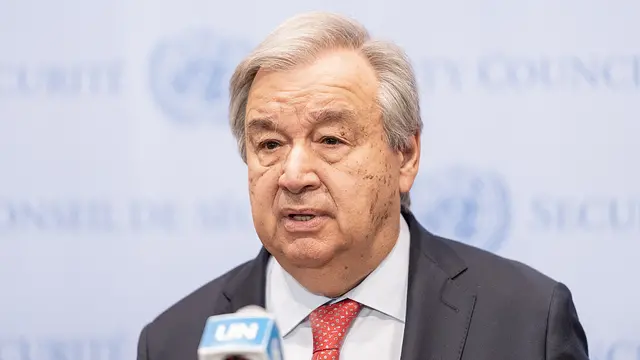The United Nations said it will continue its efforts to facilitate the access to global markets of food and fertilizers from Ukraine and Russia as Russia withdrew from the Black Sea grain deal on Monday.
The Kremlin on Monday said it was exiting a major agreement to facilitate Ukraine grain exports. "The grain deal has ceased. As soon as the Russian part (of the agreements) are fulfilled, the Russian side will immediately return to the grain deal," said Kremlin spokesman Dmitry Peskov.
Moscow has for months complained about the implementation of the grain pact, saying that elements of the deal allowing the export of Russian food and fertilizers have not been honored.
UN Secretary-General Antonio Guterres said hundreds of millions of people facing hunger around the world would "pay the price" for Russia's withdrawal, but he added that Russia's decision would not stop the international organization's efforts to "facilitate the unimpeded access" to global markets of food and fertilizers from Ukraine and Russia.
Contrary to the Kremlin's statements, Turkish President Recep Tayyip Erdogan appeared optimistic about the prospects of the grain deal being maintained. "I think that despite today's statement, my friend Putin wants to continue the agreement."
Ukrainian President Volodymyr Zelenskyy said Ukraine was prepared to keep exporting grain via the Black Sea despite Russia's exit from the deal.
"Even without the Russian Federation, everything must be done so that we can use this Black Sea corridor," Zelenskyy said.
Zelenskyy noted that he ordered the Foreign Ministry to prepare "official signals" to the United Nations and Türkiye regarding the continuation of the deal.
Russia and Ukraine signed separately with Türkiye and the UN the Black Sea Grain Initiative in Istanbul in July 2022, which allowed Ukraine to export its grain and other agricultural products from its Black Sea ports. As a parallel agreement, Russia and the United Nations signed a memorandum of understanding on the facilitation of Russian food and fertilizer exports.
The Black Sea Grain Initiative, which was initially valid for 120 days, was extended in mid-November 2022 for another 120 days until March 18, 2023. Russia then agreed to extend the deal for only 60 days. On May 17, Russia agreed to extend the deal for another 60 days.
Medium-term impact worried
Kyiv was the world's top exporter of sunflower seed oil and the fourth-largest for wheat and corn, and its exit from the global market sent prices to record highs in May. The opening of the export corridor on August 1, 2022, helped ensure supplies for importing nations and bring down prices, even if the conflict has cut Ukrainian farm output.
Analysts warned that the collapse of the Black Sea export corridor, which allowed the export of more than 32 million tonnes of Ukrainian grain over the past year, should create market tension and push up food prices over the medium term, though it should have little immediate impact. Gautier Le Molgat, an analyst at Agritel, which provides data and analysis on agricultural markets, noted that it's currently harvest season in the northern hemisphere and it is a calm period on the markets which reacted little to the news of the suspension of the deal.
"Future needs will be clear at the end of the harvest," said Le Molgat.
Though there is currently no lack of wheat on the global market, experts warned a drop in Ukraine's export volumes could create a problem. "An extended closure of the corridor will have an impact on food price inflation, which will affect food security," said the Farm Foundation's Olia Tayeb Cherif.
The UN's World Food Program is also at risk of disruption as it sources from Ukraine wheat it supplies to Afghanistan, Yemen and African nations, noted Cherif.
(CGTN)
 简体中文
简体中文

